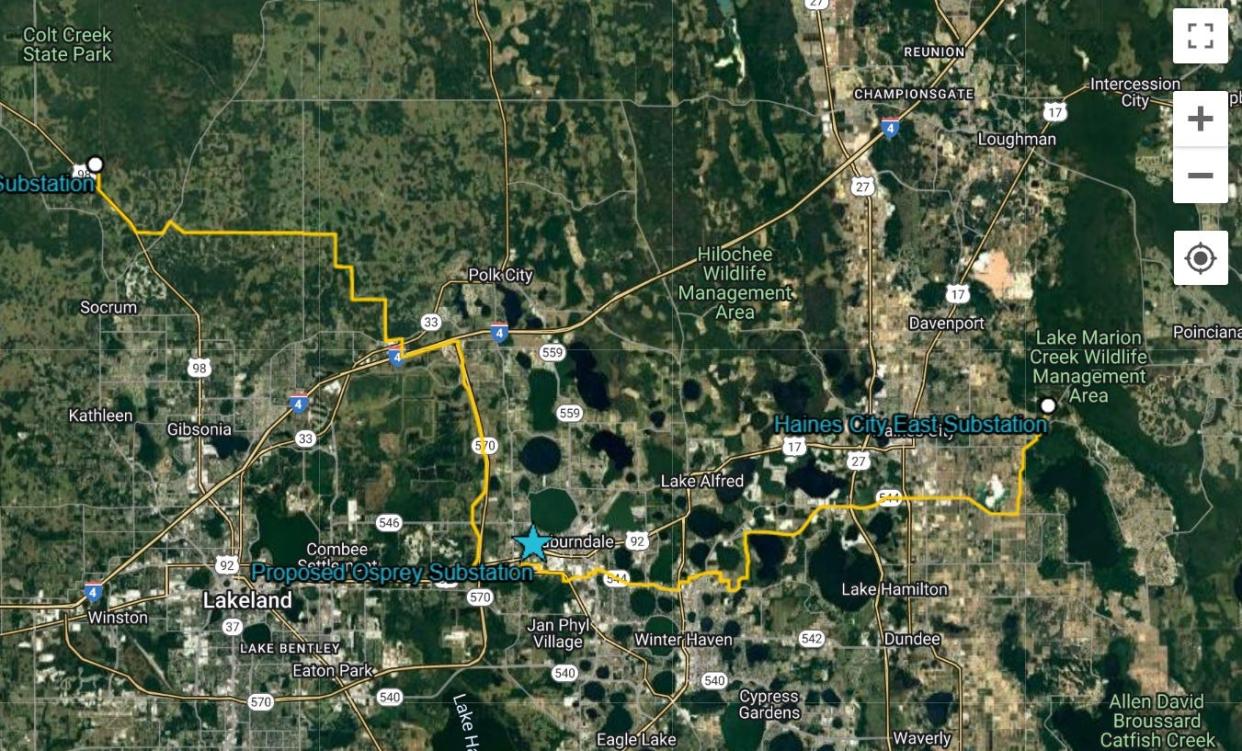Lakeland OKs deal with Duke Energy to run transmission line through sensitive wellfield

LAKELAND — Lakeland officials approved an agreement of more than $4.6 million with Duke Energy Corp. to allow a high-voltage transmission line to be run through sensitive wetlands.
City commissioners voted 5-0 Monday to approve an agreement to allow Duke Energy to build a 230kV transmission line to be built on part of Lakeland's Northeast wellfield. Commissioners Bill Read and Sara Robert McCarley were absent from the vote.
"This is extremely important to protecting the quality of water we have in the city," Mayor Bill Mutz said.
Lakeland owns approximately 880 acres off Old Polk City Road consisting primarily of wetlands and undeveloped land. The city holds a water use permit from the Southwest Florida Water Management District to pump 4 million gallons per day from the Upper Floridan Aquifer to provide residents with adequate drinking water. Duke Energy acquired the Osprey Energy Center in Auburndale, 1651 Derby Ave. W., through state-guided action. The electric utility faced a challenge of connecting the Auburndale site to its existing Kathleen Substation at 12347 U.S. 98 N. via a transmission line.
Lakeland City Attorney Palmer Davis said that when Duke first approached the city with its request to use part of the wellfield, the city denied the utility. Duke Energy then filed an eminent domain lawsuit for the property, according to Davis, as Lakeland countered by filing for an administrative hearing with Florida Department of Environmental Protection to plead its case.
The city and utility negotiated to find a compromise that would allow Duke Energy to run its transmission line through the sensitive area. Davis said one of the first steps was altering the proposed route of the transmission line toward the eastern upland portion of the the property.
"We have found a way to thread the needle through the wellfield to avoid all the wetlands," he said.
The agreement approved Monday contains several restrictions on Duke Energy's actions. The utility company will not be permitted to build any new roads or alter existing roads to service its structures. It will have to rely on placements of temporary specialized geotextile mats to move vehicles around where grounds are saturated.
Duke Energy's workers will have to remove any trees or vegetation in the path of its transmission line by hand. This may include chainsaws, Davis said, but not any heavy construction equipment. Clearing of trees and plants is supposed to be kept to a minimum, according to the contractual agreement. Given the environmental sensitivity, the city forbade the utility from using any herbicides or pesticides.
More efficient? Duke Energy is building a floating solar farm on a cooling pond in Bartow
Under the agreement, city staff will accompany and observe all of Duke's necessary maintenance activities. If Lakeland's personnel feel an action violates the terms of the agreement, endangering the city-owned wellfield, then the utility must cease any further action until the issue is resolved.
Davis said experts have reviewed and agreed to a specialized pole placement technique, which gave city staff cause for concern as punching holes in the ground could impact the aquifer and drain water reserves. The city attorney said the technique will be similar to technology used for the construction of piers for bridges.
The most important part of the agreement is Duke Energy has agreed to sign off on indemnification, or a "hold-harmless" agreement. Davis said if the utility does any damage to the northeast wellfield, it will be held responsible for covering the costs for repairs or reduction of the city's water use permit up to and including denial of renewed rights in 2038.
"We have a good agreement that protects the city," Davis said.
Once Duke Energy has completed construction on its transmission line, the city will install monitoring wells using part of the roughly $4.6 million provided by the utility to track any impact to the water supply.
Sara-Megan Walsh can be reached at swalsh@theledger.com or 863-802-7545. Follow on X @SaraWalshFl.
This article originally appeared on The Ledger: Duke will pay Lakeland $4.6M to run electric line through wellfield

